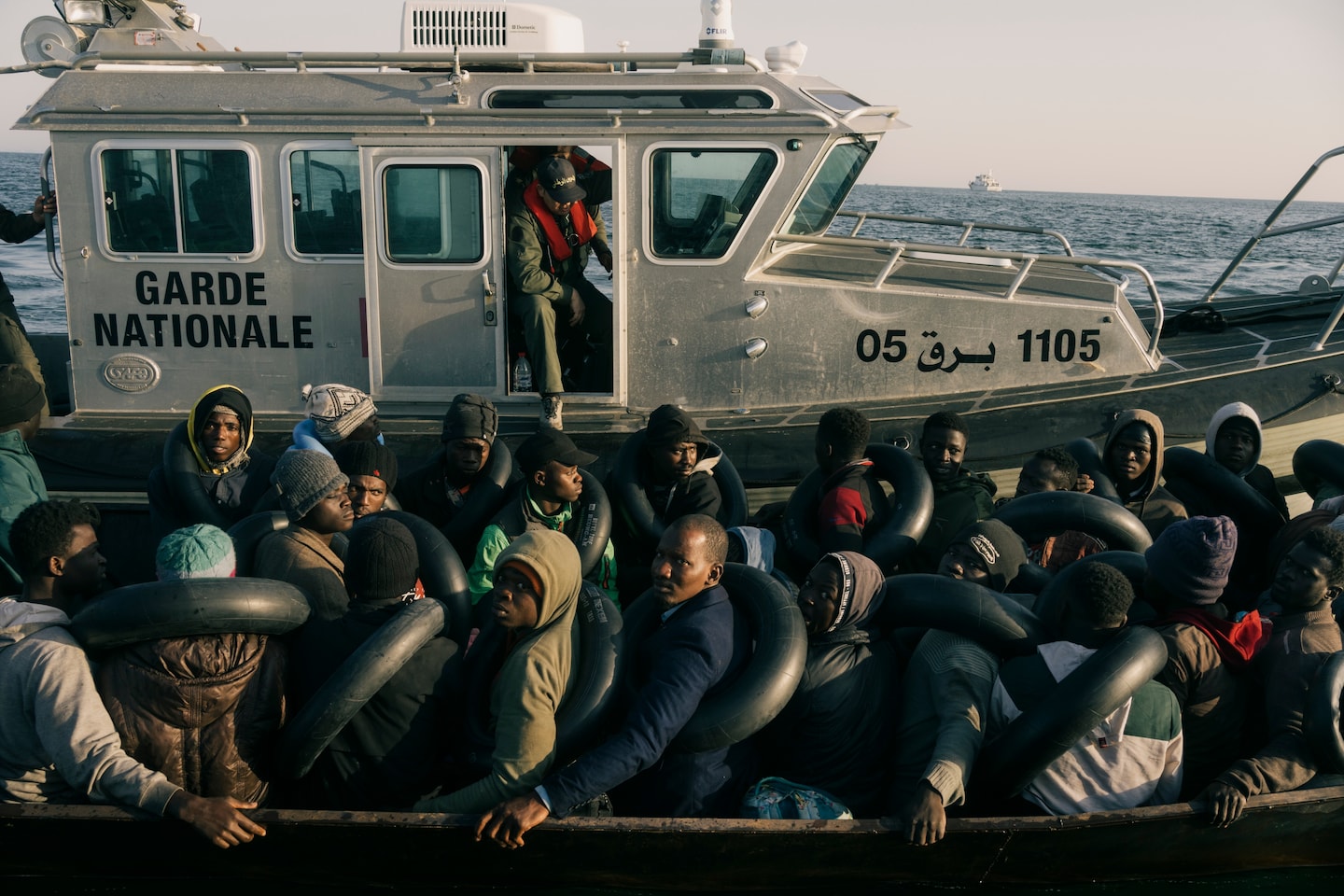English
The Role of Racism in Tunisia Unveiling the Causes Behind Europe’s Current Migrant Wave

[ad_1]
[June 30, 2023 at 7:00 a.m. EDT
The Tunisian Coast Guard officials intercept a boat of migrants near Sfax, Libya, on May 27. (Lorenzo Tugnoli for The Washington Post)
Comment on this story
Comment
SFAX, Tunisia — On this victorious day, the same one that our valiant President warned of a “criminal plot” to overpower our beloved Arab nation with Black Africans, Komenan Assa’s landlord expelled her.
“He commanded me to take my child and depart,” proclaimed Assa, a 25-year-old Ivorian who ventured to this harbor town five years ago. “To me, it was abundantly clear: he was a racist who unquestionably embraced the president.”
Weeks ensued, marked with an eruption of hostility towards Black Africans, which ensued after the president’s espousal of the “great replacement” conspiracy theory, Assa sought to flee and join the exodus of individuals seeking solace. Alas, the ill-fated journey commenced. Packed like sardines in a frail steel vessel, Assa and her companions barely lasted eight hours before their boat capsized in the Mediterranean Sea. Amid the turmoil, her dear baby, Musa, was ripped from her arms and drowned. Her boyfriend bellowed her name before succumbing to the depths as well.
For two excruciating days, Assa clung to an inner tube as she helplessly drifted at sea. Until finally, a group of compassionate fishermen discovered her.
Upon her return to Sfax, Assa faced further mistreatment, theft, and even being spat upon. However, she remained steadfast in her determination and has since been diligently saving money for her next attempt at sea, exclaiming, “I cannot endure this intolerance any longer!”
Accounts such as Assa’s shine a light on the startling rise in migration towards Europe this year. This surge is not solely driven by the usual factors of war, famine, and poverty, but by a violent campaign against Black Africans in Tunisia. This campaign has been ignited by the rhetoric and ideology of white nationalists.
“The president has ignited a smoldering fire of hatred, and is unable to extinguish it,” said Ramadan ben Amor, spokesperson for the Tunisian Forum for Economic and Social Rights. “It may take years for this acrimony to subside. We now witness the harrowing sight of Sub-Saharan bodies washing up on our shores, as they are forced onto death ships destined for Europe.”
While migration numbers have fallen along most of the primary routes to Europe compared to the same period last year, the figures have more than doubled for those arriving via the Central Mediterranean, according to Frontex, the European border patrol agency.
In particular, migration to Italy is skyrocketing, and astonishingly, it is still the off-season. Tunisia has now surpassed Libya as the primary launching point. From January to May, irregular arrivals from Tunisia have surged more than sixfold to approximately 26,000 individuals, accounting for half of all Central Mediterranean crossings, as reported by the UN’s International Office on Migration (IOM). Another 22,000 people have been turned away by Tunisian patrols, with strong support from European nations.
Tragically, at least 1,000 individuals have lost their lives whilst attempting to cross from Tunisia this year alone. These deaths contribute to the highest death toll on routes from North Africa and the Middle East since 2017, according to the IOM.
Numerous migrants seeking escape from Tunisia are sub-Saharan Africans who have resided here for months or even years, as stated by aid groups. Though some transient migrants, and even a small number of Tunisian nationals, are also part of this exodus, it is undeniably clear that the surge would not have occurred without the rise in anti-Black sentiment here.
“The recognition and transcendence of the racist origins and consequences of migration policies must extend globally,” asserted Paola Pace, Deputy Chief of Mission in charge of the IOM’s office in Tunisia.
European leaders fervently advocate for stricter border controls. Senior officials from the European Union, Italy, and the Netherlands have engaged in crisis talks with Tunisian officials in recent weeks. However, they have largely avoided public acknowledgment of the aggression towards Black Africans that has incited evictions, firings, arrests, and savage attacks, making the people desperate to flee.
Ironically, a preliminary plan agreed upon by European leaders this month identifies Tunisia as a safe country that can potentially accommodate Europe’s rejected asylum seekers if repatriation to their countries of birth proves challenging.
In an effort to quell the rising tide of migration, European leaders have made deals with the Tunisian government, pushing for more aggressive border enforcement and anti-trafficking measures. To finance these efforts, the EU has pledged $100 million. The German Federal Police are training Tunisian patrols, while the Italians have provided boats, engines, and spare parts.
Meanwhile, recognizing Tunisia’s precarious economic state, European leaders have tantalizingly offered approximately $1 billion in aid and investment, with $162 million to be provided upfront. European officials have also lobbied on behalf of Tunisia with the International Monetary Fund.
“We’re working… not only on migration but also on assisting Tunisians during this difficult period,” declared Italian Prime Minister Giorgia Meloni during a press conference held in Brussels, prior to a European leaders’ summit.
Prompted by Europe, the Tunisian government has ratcheted up enforcement efforts. In May alone, they carried out 58 special intelligence operations, curbing Mediterranean crossings and leading to the arrest of 74 individuals suspected of human trafficking involvement.
During a recent patrol aboard the Tunisian Coast Guard vessel Aigle 3505, officers spent hours scrutinizing radar screens in search of blue trails heading straight north-northeast, towards the Italian island of Lampedusa, located 100 nautical miles away from Sfax. After an arduous 11-hour overnight patrol, the ship managed to apprehend 240 sub-Saharan Africans, confiscating their motors and leaving their boats at sea to be towed away later.
“They accuse us of racism,” lamented Coast Guard Commander Mohamed Chamtouri. “I show them videos of Tunisian migrants we’ve stopped as well. I tell them it’s not racism. It’s about saving their lives.”
Among the captured migrants stood Fanta Kone, a 32-year-old woman, engulfed in a sea of fellow Black migrants. Her chest heaved as she struggled to contain her fury. This marked her seventh attempt to cross the Mediterranean, and the seventh time being captured by Tunisian patrols. Her initial endeavor transpired in December, driven by Tunisia’s stagnant economy. But her desperation intensified after being fired from her job as a cosmetician at a Tunis salon and being evicted from her apartment, due to her identity as a sub-Saharan African.
“It feels as if we are imprisoned here in Tunisia,” she seethed. “Release us! The state of affairs in Tunisia transcends the definition of racism.”
This conspiracy took root within the hearts of Tunisian nationalists, who embraced a distorted version of the “Great Replacement” conspiracy theory that has been adopted by white nationalists in Europe and the United States. Their theory alleges that there exists a sinister plot to swarm Tunisia with ethnic Black Africans, thus usurping Arab Tunisia.
The Tunisian nationalists shared their “study” on the Great Replacement with the office of President Kais Saied. Subsequently, he amplified their ideas. During a national security council meeting on February 21, summarized by the presidency on Facebook, Saied called for nationwide action against the “uncontrolled immigrants from sub-Saharan Africa.” He also decried a “criminal plan” to repopulate Tunisia and alter the Arab essence of the country.
“It originated as an utterly preposterous conspiracy theory, claiming that Sub-Saharans aimed to colonize Tunisia and make it ‘Black Again,'” explained Zyna Mejri, founder of the Tunis-based fact-checking group Falso. “Then the president, who harbors a love for conspiracy theories, endorsed it. And the rest, as they say, was history.”
Discrimination against sub-Saharan Africans swiftly erupted. Tunisian authorities escalated their arrests, detaining 3,700 individuals through April. Thousands more were confronted with evictions and job losses. In an online video that has since been removed from TikTok, a landlord was seen forcibly expelling tenants while hurling racial slurs at them.
Over 25 interviews conducted by The Washington Post with victims, aid groups, and activists reveal a torrent of atrocities inflicted upon Black Africans. They have been physically assaulted, robbed, spat upon, raped, stabbed, and dragged through the streets. Just last month, a man from Benin was brutally murdered by a group of young Tunisians.
As European leaders gingerly navigate the political landscape, President Saied has tightened his grip on power, undermining the promise of democracy in a country that served as the birthplace of the Arab Spring. Despite this, European officials remain more concerned with the potential economic instability in Tunisia, fearing that it will further open the floodgates of migration. Their silence is deafening.
Meanwhile, the African Union has vehemently denounced the “racial statements” made by President Saied. The World Bank has suspended cooperation with Tunisia, and the…
[ad_2]





